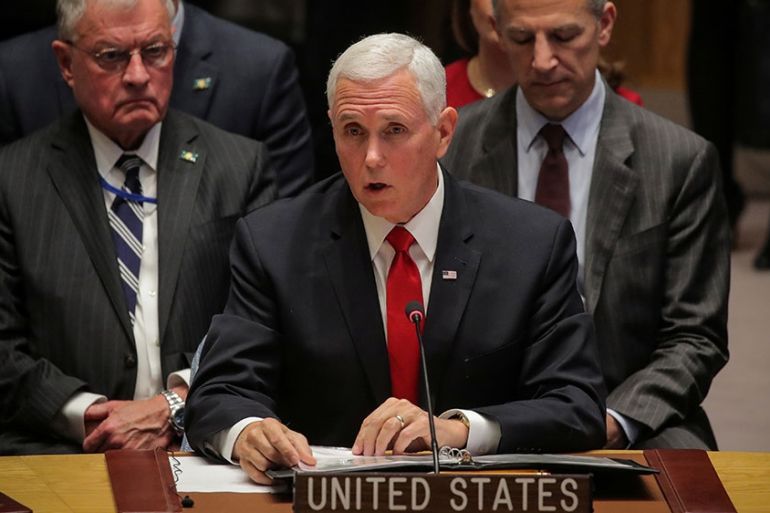US calls on UN to recognise Guaido as Venezuela’s president
US Vice President Mike Pence urges body to revoke UN credentials of the government of Nicolas Maduro.

Caracas, Venezuela – US Vice President Mike Pence asked the United Nations on Wednesday to revoke the UN credentials of the government of Nicolas Maduro and recognise opposition leader Juan Guaido as Venezuela‘s legitimate president.
“The time has come for the United Nations to recognise interim president Juan Guaido as the legitimate president of Venezuela and seat his representative in this body,” Pence told the UN Security Council, adding that he has drafted a resolution on Venezuela. It was unclear when and where – either the Security Council or General Assembly – he planned to introduce the resolution.
Keep reading
list of 4 itemsTunisian lawyer arrested during live news report
Vladimir Putin sworn in for fifth term as Russian president
What’s at stake in Chad’s presidential election?
Pence also announced that the US government will provide other $60m in humanitarian aid to Venezuela.
More than 50 countries have recognised Guaido as Venezuela’s leader since the opposition leader declared himself interim president on January 23, calling Maduro’s presidency illegitimate. On Tuesday, the Organisation of American States (OAS) recognised the envoy of Guaido as the regional group’s official Venezuelan delegate.
Maduro accuses Guaido and the US of attempting to stage a coup, and many believe any resolution the US introduces at the UN will fall short of the support needed to pass.
Still, Pence expressed optimism, telling reporters that he believes “the momentum is on the side of freedom”, Reuters reported.
Maduro maintains the support of Cuba, Russia, Turkey and China, among other countries.
Russian Ambassador to the UN Vassily Nebenzia said the US should stop interfering in the affairs of other countries.
“We call on the United States to once again recognise that the Venezuelan people and other peoples have the right to determine their own future,” Nebenzia said. “If you want to make America great again, and we are all sincerely interested in seeing that, stop interfering in the affairs of other states.”
Maria Alejandra Diaz, a Venezuelan analyst, told Al Jazeera Pence’s call is a “sign of the despair from the United States”.
“They are trying to impose by force its own will,” Diaz said.
“The US is trying to impose an alleged crisis, they are violating our sovereignty principles, and forcing the international world to take its approach,” she added. “This is a crucial moment for the world, this moment will define towards which side the balance is going to tilt, towards unipolarity or multipolarity.”
‘Real humanitarian problem’
The US called Wednesday’s Security Council meeting to discuss the humanitarian crisis in Venezuela.
During the meeting, UN aid chief Mark Lowcock emphasised the need for international help, calling the situation a “very real humanitarian problem”.
“The scale of need is significant and growing,” Lockcock said. “We can do more to relieve the suffering of the people of Venezuela, if we get more help and support from all stakeholders.”
According to the UN, about 2.8 million Venezuelans are in need of healthcare. This includes some 300,000 people whose lives are at risk because they have been unable to access medicines or treatment for diseases like cancer, diabetes and HIV for more than a year.
Maduro says there is no crisis and has repeatedly blamed the US sanctions for the country’s economic collapse. On Tuesday, Maduro said his country was ready to receive international aid. He was speaking after a meeting with the chief of the International Committee of the Red Cross.
Human Rights Watch has also urged the UN to declare the situation in Venezuela “a complex humanitarian emergency that poses a serious risk to the region”.
‘I don’t have means to navigate crisis’
Pence’s calls came just hours after a new blackout hit parts of Venezuela, adding additional stress on Venezuelans who have already been hit with numerous blackouts as they try to cope with hyperinflation and food, water and medicine shortages.
“I can’t resist this situation any more, this time, my fridge broke and how am I supposed to fix it?” Venezuelan Wendy Mijares told Al Jazeera.
“On top of that, food is also becoming an increasingly important problem, I just don’t have the resources to navigate this crisis, money is not enough” she added.
The electricity shortage hit a large section of the capital, and at least 20 of the 23 states of Venezuela were affected.
Many analysts in Venezuela say the priority for most in the country is to return to a sense of normality.
“In the middle of all these problems with power and water, what most of the people are seeking is for the country to return to normal, they want to go back to a normal life” Marco Teruggi, a Venezuelan analyst, said.
“This goes beyond any attempt of intervention, or any political battle,” he added.
Additional reporting by Alicia Hernandez in Caracas